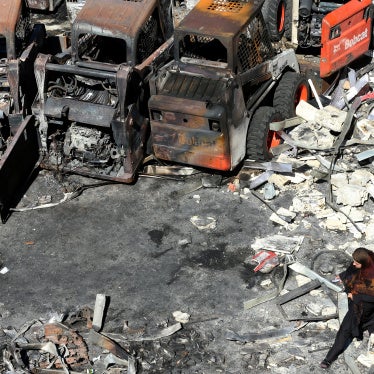Libya’s internal security agency has held an outspoken critic of Libyan leader Muammar al-Qadhafi in incommunicado detention for almost a month, Human Rights Watch said today.
Libya’s Internal Security Agency detained Idrees Mohamed Boufayed, a doctor who had been living in Switzerland for the past 16 years, on November 5 during a visit to Libya, his family and Libyan organizations abroad report. They have not seen or heard from him since.
“Libya may be opening to the world, but the government is still locking up its critics,” said Sarah Leah Whitson, Middle East and North Africa director at Human Rights Watch. “The United States and the European Union shouldn’t remain silent just because they’re cooperating on counterterrorism and oil investments.”
Boufayed returned to Libya for a visit on September 30 after 16 years in exile in Switzerland. In recent years, al-Qadhafi and top government officials have publicly promised that government critics could safely return.
According to Boufayed, security agents at the airport interrogated him upon arrival for one and a half hours. They let him go, but kept his passport without providing a receipt and instructed him to report back in one week.
Boufayed traveled to his family home in Gheryan, about 75 miles south of Tripoli. There he continued his political activities by posting articles to Libyan opposition websites, denouncing al-Qadhafi, and calling for peaceful political change.
During the night of November 2, internal security agents came to Boufayed’s home and ordered him to report to the Gheryan office of the Internal Security Agency the following day. The next morning, agents there questioned him briefly and told him to report to their Tripoli office on November 5. Before traveling to Tripoli, Boufayed sent a letter to opposition websites in which he publicized his interactions with the security agency and announced his intention to report to their Tripoli office later that week.
He wrote: “Demanding our rights and the rights of our people in freedom and pluralistic democracy, respect for human rights and basic freedoms of thought, opinion and expression, as well as freedom of association and organizing, in addition to freedom to assemble and protest, are all fundamental rights, and there can be no negotiation or haggling about them, irrespective of the consequences.”
Boufayed traveled to Tripoli on November 5 and has not been seen since. Human Rights Watch requested information on his detention from the Libyan government on November 20 but to date has received no reply.
Under Libyan law, the police can hold a person for up to 48 hours, and the prosecution has up to six days to file charges, although a judge can extend this period for up to 30 days. Defendants have the right to be informed of the charges against them and to have access to a lawyer from the moment of arrest. They can hire a private attorney or get one appointed at no cost by the state.
In practice, these guarantees are frequently flouted, Human Rights Watch said.
According to Libyan émigré groups, Boufayed was born in 1957 in Gheryan. He graduated in 1982 from the University of Garyounis Medical School. In 1987, the government sent him to serve as a physician for Libyan forces in the war with Chad, where he was captured by Chadian forces and held as a prisoner of war. According to former Libyan prisoners of war, Boufayed provided crucial medical services during their incarceration, as well as funeral services to those who died.
Reportedly angry that al-Qadhafi failed to take steps on behalf of Libyan prisoners of war in Chad, Boufayed joined the opposition National Front for the Salvation of Libya, which had an armed wing. He was released from Chadian prison in 1990 and went to Switzerland, where he received political asylum. He has lived there ever since, working as a doctor and running a small Libyan opposition group called the National Union for Reform.
In writings posted to Libyan opposition websites, Boufayed has advocated peaceful change to promote the rule of law and respect for human rights. He is not known to have used or advocated the use of force.
“We urge the Libyan government to release Dr. Boufayed immediately,” Whitson said. “It appears they’ve locked him up for expressing views they don’t like.”








